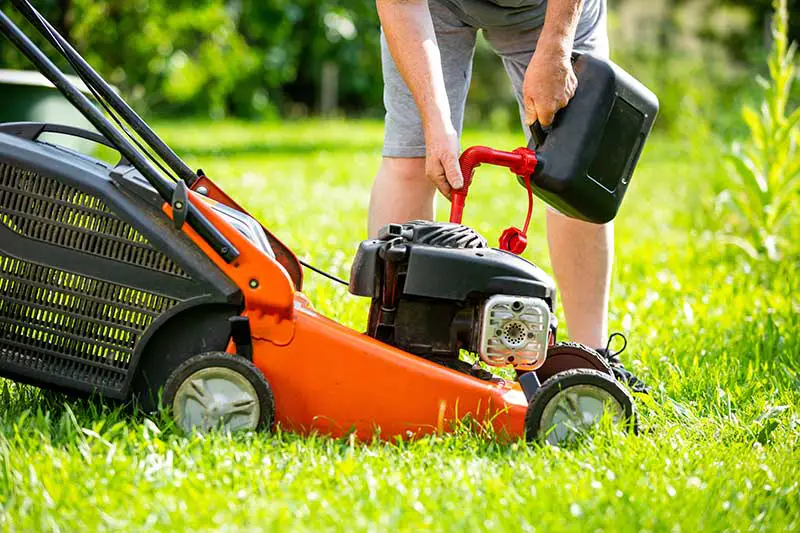The best gas for your lawn mower is typically a minimum of 87 octane and with no more than 10% ethanol (E10). Maintain your mower’s fuel system by using fresh gas, adding fuel stabilizers, and storing gas safely.

Understanding Lawn Mower Fuel Requirements
Lawn mowers typically run on gasoline, but it’s essential to know the right type of fuel for your specific mower. Consult your lawn mower’s owner’s manual for the recommended gasoline type, usually listed as a minimum octane rating. Most lawn mowers require regular unleaded gasoline with an octane rating of 87 or higher. Some high-performance mowers might need mid-grade or premium gasoline with a higher octane rating.
Table: Lawn Mower Fuel Types
| Fuel Type | Octane Rating | Compatibility |
|---|---|---|
| Regular Unleaded | 87 | Most lawn mowers |
| Mid-grade Unleaded | 89 | Some high-performance mowers |
| Premium Unleaded | 91+ | Rarely required, consult manual |
Octane ratings may vary based on the manufacturer’s recommendations.
“Use gasoline with an octane rating of 87 or higher for most lawn mowers.”
In addition to the octane rating, consider the ethanol content in the gasoline. Most gasoline in the United States contains up to 10% ethanol (E10), which is typically safe for lawn mowers. However, avoid using gasoline with more than 10% ethanol (E15, E85, or higher) as it can damage small engines.
Choosing the Right Gasoline for Your Lawn Mower
When selecting gasoline for your lawn mower, consider the following factors:
- Octane rating: Choose gasoline with an octane rating that meets or exceeds your mower’s requirements. For example, if your mower’s manual specifies an 87 octane rating, using a 91 octane gasoline won’t provide any additional benefits.
- Ethanol content: While most gasoline contains up to 10% ethanol (E10), some fuel stations offer ethanol-free gasoline. Although it can be more expensive, ethanol-free gasoline may provide better performance and longevity for your lawn mower engine.
- Freshness: Gasoline degrades over time, so always use fresh fuel. Avoid using gasoline that has been stored for more than 30 days without a fuel stabilizer. If you need to store gasoline for extended periods, use a fuel stabilizer to prevent degradation and maintain its quality.
To ensure optimal lawn mower performance, always choose gasoline with the right octane rating, ethanol content, and freshness. Keep an eye out for signs of bad gasoline, such as difficulty starting the engine, decreased performance, or increased engine noise. If you suspect your mower has been affected by bad fuel, drain the old gasoline and replace it with fresh, high-quality fuel.
Avoiding Fuel-Related Lawn Mower Problems
Fuel-related problems can cause various issues in lawn mowers, such as decreased performance, difficulty starting, and engine damage. To avoid these problems, follow these best practices:
- Use fresh gasoline: Gasoline degrades over time, losing its combustibility and forming deposits that can clog the carburetor. Always use fresh gasoline and avoid using fuel that has been stored for more than 30 days without a stabilizer.
- Check the fuel cap: Ensure the fuel cap is properly tightened and its vent is clear of debris. A blocked vent can create a vacuum in the tank, preventing fuel from flowing to the engine.
- Clean the carburetor: Periodically clean the carburetor to remove any deposits or dirt that may have accumulated. This will help maintain optimal fuel flow and engine performance.
- Replace the fuel filter: Replace the fuel filter according to the manufacturer’s recommendations to prevent debris and contaminants from reaching the engine.
“Always use fresh gasoline and maintain your lawn mower’s fuel system to avoid fuel-related problems.”
The Importance of Fuel Stabilizers and Additives
Fuel stabilizers and additives play a crucial role in maintaining your lawn mower’s performance and extending the life of its engine. They serve the following purposes:
- Prevent fuel degradation: Fuel stabilizers slow down the oxidation process and prevent the formation of gum and varnish deposits. They help maintain the quality of stored gasoline for up to 12 months.
- Protect against ethanol damage: Some additives are designed to counteract the harmful effects of ethanol in gasoline. They prevent corrosion and phase separation, which can occur when water mixes with ethanol.
- Clean the fuel system: Fuel system cleaners remove deposits from the carburetor, fuel injectors, and combustion chamber, improving overall engine performance.
Table: Types of Fuel Additives
| Additive Type | Purpose |
|---|---|
| Fuel Stabilizer | Prevents fuel degradation during storage |
| Ethanol Treatment | Protects against ethanol-related damage |
| Fuel System Cleaner | Cleans and removes deposits from the fuel system |
When using additives, follow the manufacturer’s recommendations for dosage and compatibility.
Incorporating fuel stabilizers and additives into your lawn mower maintenance routine can help prevent fuel-related issues, protect your engine, and prolong its life. Always follow the manufacturer’s recommendations for the proper use of these products.
Storing and Handling Lawn Mower Gasoline Safely
Proper storage and handling of lawn mower gasoline are essential to ensure safety and maintain fuel quality. Follow these tips for safe storage and handling:
- Use an approved fuel container: Store gasoline in a container specifically designed for fuel storage, which is made of durable materials and features a tightly-sealing cap and a spout for easy pouring.
- Store in a cool, well-ventilated area: Gasoline should be stored away from direct sunlight and heat sources, in a well-ventilated area to prevent pressure buildup and minimize the risk of ignition.
- Keep away from open flames and sparks: Always store gasoline away from open flames, sparks, or any other ignition sources, as it is highly flammable.
- Label the container: Clearly label the fuel container to avoid confusion and ensure that only the appropriate fuel is used in your lawn mower.
- Avoid overfilling the lawn mower tank: When refueling your lawn mower, leave some space in the tank for fuel expansion to avoid spills and potential fire hazards.
“Store gasoline in an approved container in a cool, well-ventilated area, and handle it carefully to ensure safety and maintain fuel quality.”
How to Drain and Replace Lawn Mower Gasoline
Draining and replacing old or contaminated gasoline is essential for maintaining your lawn mower’s performance. Follow these steps to drain and replace your lawn mower gasoline:
- Disconnect the spark plug: Before working on your lawn mower, always disconnect the spark plug to prevent accidental ignition.
- Position the mower: Place a container under the fuel tank to catch any spilled gasoline. Tilt the mower so that the fuel tank opening is facing downward.
- Remove the fuel cap: Carefully remove the fuel cap and allow the gasoline to drain into the container.
- Clean the fuel tank: Once the gasoline has been drained, clean the fuel tank using a lint-free cloth to remove any sediment or debris.
- Refill with fresh gasoline: Refill the fuel tank with fresh gasoline, being careful not to overfill it. Replace the fuel cap and reconnect the spark plug.
By draining and replacing old or contaminated gasoline, you can prevent many fuel-related problems and ensure optimal lawn mower performance.
Troubleshooting Gasoline-Related Lawn Mower Issues
Gasoline-related issues can affect your lawn mower’s performance and lifespan. Here are some common gasoline-related problems and their solutions:
- Engine won’t start or runs poorly: This may be caused by stale gasoline, water contamination, or an incorrect gasoline-to-oil ratio in 2-stroke engines. Drain the fuel tank and refill with fresh gasoline. For 2-stroke engines, ensure the correct gasoline-to-oil ratio is used.
- Clogged fuel filter: A clogged fuel filter can restrict fuel flow and cause performance issues. Replace the fuel filter as recommended by the manufacturer.
- Fuel leaks: Inspect the fuel lines, connections, and fuel tank for any signs of leakage. Replace damaged or worn parts as needed.
“Regularly check your lawn mower for gasoline-related issues, such as stale gasoline or clogged fuel filters, to ensure optimal performance and a longer lifespan.”
Effects of Ethanol in Lawn Mower Gasoline
Ethanol, a common additive in gasoline, can cause problems in lawn mowers. These issues include:
- Corrosion: Ethanol attracts moisture, which can lead to corrosion in the fuel system, especially in older lawn mowers not designed to handle ethanol-blended fuels.
- Decreased performance: Ethanol has a lower energy content than gasoline, which may result in reduced power and fuel efficiency.
- Fuel system damage: Ethanol can degrade rubber and plastic components in the fuel system, leading to leaks and other issues.
To minimize the effects of ethanol in lawn mower gasoline:
- Use ethanol-free gasoline if available
- Use fuel stabilizers specifically formulated to protect against ethanol-related issues
- Store gasoline properly to minimize moisture absorption
By taking these precautions, you can reduce the potential harm caused by ethanol in lawn mower gasoline.
Gasoline Alternatives and Environmentally Friendly Lawn Mowers
Environmentally conscious homeowners may consider gasoline alternatives or eco-friendly lawn mowers to reduce their carbon footprint. Some options include:
- Electric lawn mowers: These mowers run on electricity, either through a power cord or a rechargeable battery. They produce no emissions, are quieter, and require less maintenance compared to gas-powered mowers.
- Propane-powered lawn mowers: Propane is a cleaner-burning fuel than gasoline, reducing emissions and improving air quality. These mowers may have a higher upfront cost but offer lower operating expenses over time.
- Solar-powered lawn mowers: These mowers harness solar energy to power electric motors, eliminating the need for gasoline or electricity. They are still relatively uncommon and may be more expensive than other alternatives.
- Manual reel mowers: A classic, eco-friendly option, manual reel mowers require no fuel or electricity and emit no pollution. They are best suited for small, flat lawns.
“Consider environmentally friendly alternatives like electric, propane-powered, solar-powered, or manual reel mowers to reduce emissions and lower your carbon footprint.”
Ensuring Proper Fuel Maintenance for Lawn Mower Performance
Proper fuel maintenance is essential for optimal lawn mower performance and longevity. Here are some tips to help maintain your lawn mower’s fuel system:
- Use fresh gasoline: Gasoline can degrade over time, so use fresh fuel and avoid storing it for more than 30 days.
- Use the right gasoline grade: Follow the manufacturer’s recommendations for the appropriate gasoline grade, typically 87 octane or higher.
- Use fuel stabilizers: Adding a fuel stabilizer to gasoline can extend its shelf life and help protect the fuel system from ethanol-related issues.
- Store gasoline properly: Keep gasoline in a tightly sealed, approved container, away from direct sunlight and temperature fluctuations.
- Perform regular maintenance: Regularly inspect and clean the fuel system components, such as the fuel filter, lines, and tank, to prevent issues caused by debris or contamination.
By following these tips, you can ensure proper fuel maintenance and keep your lawn mower running smoothly for years to come.
Key Takeaways
- Use the right gasoline for your lawn mower, typically a minimum of 87 octane and with no more than 10% ethanol (E10).
- Avoid fuel-related lawn mower problems by using fresh gasoline, adding fuel stabilizers, and properly storing gasoline.
- Store and handle gasoline safely in a tightly sealed, approved container, away from heat sources and children.
- Drain and replace old or contaminated gasoline in your lawn mower to prevent performance issues.
- Consider environmentally friendly alternatives like electric, propane-powered, solar-powered, or manual reel mowers.
- Maintain your lawn mower’s fuel system with regular inspections, cleaning, and following manufacturer recommendations.
Conclusion
Selecting the right gasoline and maintaining your lawn mower’s fuel system is essential for optimal performance and longevity. Always follow the manufacturer’s recommendations for gasoline grade, and consider using fuel stabilizers to protect your mower’s fuel system. Store gasoline safely, and don’t hesitate to drain and replace old or contaminated fuel. For eco-conscious homeowners, consider gasoline alternatives like electric or propane-powered mowers to reduce emissions.
